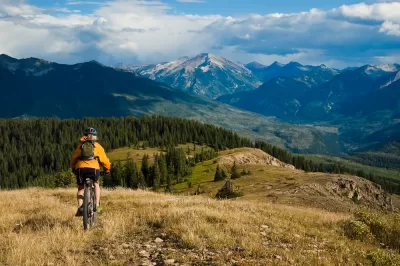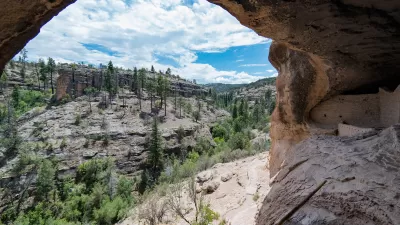Environmental groups are split over legislation that would remove the nationwide ban on bicycles in the wild.

A proposal, from national nonprofit Sustainable Trails Coalition, would allow other federal agencies to decide whether to apply language in the U.S. Wilderness Act banning "mechanical transport" to bikes on a case-by-case basis.
Since bikes are currently banned on 106 million acres of federal wilderness land in the United States, that flexibility could make a big dent.
Local conservation groups in Oregon have opposed the proposal—some for reasons more philosophical than ecological. In an article by Jamie Hale for The Oregonian, activists say they're protecting a perceived ethos of nature; one spokesperson cites values of "humility" and "restraint," claiming that bikes don't "belong" in nature.
A more pragmatic approach comes up in the comments, where locals argue that the velocity and volume of mountain bikes amplifies their impact on trails.
But if a philosophy of the wilderness remains at issue, it’s worth noting that an attitude that sees only organic access to nature as legitimate can also impact people who use strollers, wheelchairs, and other tools that, while allowed on trails, still face barriers to accommodation there.
Congress has not yet acted on the proposal. If it were to pass, agencies would determine how to approach the issue, and could impose their own restrictions on bikes.
FULL STORY: Do mountain bikes belong in the wild? Battle brewing over bike access to federal land

Planetizen Federal Action Tracker
A weekly monitor of how Trump’s orders and actions are impacting planners and planning in America.

Congressman Proposes Bill to Rename DC Metro “Trump Train”
The Make Autorail Great Again Act would withhold federal funding to the system until the Washington Metropolitan Area Transit Authority (WMATA), rebrands as the Washington Metropolitan Authority for Greater Access (WMAGA).

The Simple Legislative Tool Transforming Vacant Downtowns
In California, Michigan and Georgia, an easy win is bringing dollars — and delight — back to city centers.

The States Losing Rural Delivery Rooms at an Alarming Pace
In some states, as few as 9% of rural hospitals still deliver babies. As a result, rising pre-term births, no adequate pre-term care and harrowing close calls are a growing reality.

The Small South Asian Republic Going all in on EVs
Thanks to one simple policy change less than five years ago, 65% of new cars in this Himalayan country are now electric.

DC Backpedals on Bike Lane Protection, Swaps Barriers for Paint
Citing aesthetic concerns, the city is removing the concrete barriers and flexposts that once separated Arizona Avenue cyclists from motor vehicles.
Urban Design for Planners 1: Software Tools
This six-course series explores essential urban design concepts using open source software and equips planners with the tools they need to participate fully in the urban design process.
Planning for Universal Design
Learn the tools for implementing Universal Design in planning regulations.
Smith Gee Studio
City of Charlotte
City of Camden Redevelopment Agency
City of Astoria
Transportation Research & Education Center (TREC) at Portland State University
US High Speed Rail Association
City of Camden Redevelopment Agency
Municipality of Princeton (NJ)




























